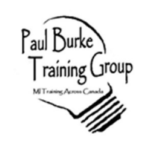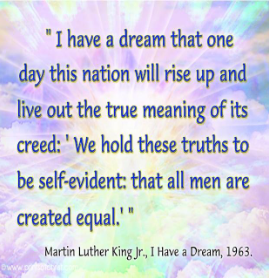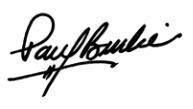
Paul Burke Training Group
Telephone: 1-250-385-6468. Toll-Free: 1-855-MI-TRAINERS
Web: www.paulburketraining.com
E-mail: info@paulburketraining.com
Beyond training: Looking at learning MI in a whole new light!
Thoughts on Improved Practice (TIP) #2310

Dr. Martin Luther King Jr. knew how to activate motivation. He believed in change talk, and most of all in “Taking Steps”. He didn’t just talk the talk. He walked the walk.
Literally.
These are the shoes (boots) worn by Dr. Martin Luther King Jr. during the “Freedom March” (on display at the King Center in Atlanta, Georgia). They are very big shoes to fill.
A few years ago I was at a conference in Atlanta, Georgia. I toured Dr. King’s home there (now a museum) and the national tribute to him in Atlanta in the form of the
Dr. Martin Luther King National Park. The artifacts and displays that abound in tribute to him, and the role he played as “activator of the dream” seemed so clear to me. It got me to wondering about how his approach was so successful in evoking change talk – not just from a few – but from an entire nation! Motivational interviewing also has a role to play in activating dreams. Dreaming begets change talk – even if it starts with “dream talk”!
Dreams as Change Talk of The Spirit!
Dr. King’s home is a mecca of sorts; a place where people go, thousands and thousands every year, to show their respect, and admiration, and gratitude – all for a man who died at the hands of another. Even now – almost 50 years ago.
People speak quietly as they walk up and down Auburn Street. Reverence hangs in the air. People stroll around the huge reflecting pools that encircle his tomb in a peaceful way. Pensive. Reverent. They walk softly. Gently. Reflection is what this place is all about.
Martin Luther King Jr. was born on this street. He worshipped here. He sat in the front pew at Ebenezer Baptist Church and he listened to the sermons of his father and his grandfather, not knowing then that he would someday preach from behind that same pulpit himself.
Martin Luther King was not a big man – at least not by measure of his height. Still, he was a giant when measured by the effect he’s had (and continues to have) on the dreams of a nation. Without question, Martin Luther King Jr. was a liberator of hope. He evoked motivation-for-change in millions of people, in both black and in white; in both women and in men; in both the ignorant and in the wise. Martin Luther King Jr. understood that evoking a dream could activate change and stimulate fresh hope. He invested his life in evoking the American dream of equality and freedom for all. And, as he awakened that dream within the masses who heard him speak, change talk rose up and demanded to be heard.
Dear Diary:
Today, I’m in Atlanta for a meeting of MI trainers from around the world. Atlanta’s a very beautiful city. There’s more green space here than I’ve ever seen in an urban space. I toured the neighborhood of Dr. Martin Luther King Jr. today – and reflected a lot on the life that he lived. Wow! What an amazing, amazing, man.
As I watched the video footage today of his historic speech (“I Have a Dream”), I couldn’t help but notice how his work was about providing fuel for hope. A lot of people think, it seems, that he was able to “implant” his famous dream into the American psyche and thus persuade his society to re-envision their ways. I disagree.
I don’t think Dr. King implanted his dream at all. I think that when he said that “I have been to the mountain top, and I’ve looked over…”, people recognized that dream. It didn’t live inside of him. It lived inside of them. He just reminded them of that. Until then, for the masses, equality was a dream without any hope.
Dr. King evoked their ability to see it. To dream it. To hope for it. He emancipated their courage. Courage to seek out their freedom. To feel it. To taste it. To live for it. (And maybe if necessary, even to die for it -as he himself did).
His words were not a descriptive speech. They were evocative ones. When he spoke the last words, “I’m free at last!”, people heard themselves hoping their own change talk into existence. “I want justice,” said their newly empowered inner voice. “I need equality”. Again and again it spoke. “Because all men were created equal” was reason enough, in the same way that “We can stand up” was ability for all.

Dr. King gave words to the hope of a people and the dream of a nation. Dreams are not passive things. They are the change talk of the spirit.
Tonight, I’m thinking that making dreams come true begins with the inviting the dream into awareness. I wonder what Motivational Interviewers could do to help more of our clients invite more of their dreams into awareness?
What can we do, I wonder, in the service of our desire to help; to evoke “dream talk”?
What about the dream to stop smoking? Or for a Dad to build a good life for his kids? What about the dream to provide care for the poor, or to go back to school, or to learn to love again – when all hope has gone? What of Susan Boyle’s dream to sing at Carnegie Hall? What if Banting had never dreamed of finding a treatment for diabetes. What about…
Until next week …


Paul Burke Training & Consulting Group (www.paulburketraining.com)
